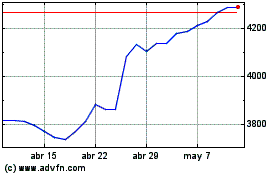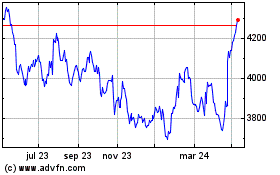By Sharon Terlep
More Americans are buying cleaning products marketed as
eco-friendly or all-natural, but not necessarily because they want
to.
Cleaning mainstays such as Clorox wipes and Lysol sprays are in
short supply in stores and online amid the coronavirus pandemic,
leading shoppers to seek alternatives such as the so-called green
brands they once passed over, retailers and analysts say.
"There are no mainstream products available, so as a retailer
you look to satisfy consumers' needs with whatever products you can
find," said Jason Kirsch, who operates the Corner Market &
Pharmacy, outside Washington, D.C.
For weeks, he said, he has been unable to secure mainstream
cleaning products, so he began to order any brands that had
products available, such as Seventh Generation, an eco brand.
"Typically, there is available supply of these alternative
products," he said.
Store shelves with a handful of green cleaning products sitting
next to empty shelves that once held big-brand wipes and sprays
have become an increasingly common sight.
On Amazon.com Inc. and Target Corp.'s website, Clorox and Lysol
products are rarely available. While even alternative brands have
limited supply, items from brands such as Mrs. Meyer's and
Babyganics are often in stock.
Some businesses that have used green products are switching to
traditional cleaners, as well, cutting into supplies. Last month,
Santander Bank, in an email to customers, said it was "reverting
back to traditional disinfectant cleaning products."
U.S. sales of mainstream household cleaners jumped 77% for the
four-week period ended April 4 compared with a year ago, according
to Nielsen. Sales of cleaners branded as environmentally friendly,
a still-small slice of the market, had a 71% bump in the same
period.
Chemists and brands say products made with milder or natural
ingredients are just as effective as traditional products in
fighting coronavirus. Many customers feel more comfortable with a
familiar brand right now because of the perception they are
tried-and-tested or include more potent chemicals, analysts
say.
For home cleaning, the Centers for Disease Control and
Prevention recommends cleaning frequently touched surfaces, such as
doorknobs and light switches, throughout the day with products that
meet the Environmental Protection Agency's criteria for use against
SARS-CoV-2, the virus that causes Covid-19.
"We are seeing unprecedented demand in our products, I wish it
were under different circumstances," said Seventh Generation Chief
Executive Joey Bergstein.
The brand, owned by Unilever PLC, has a line of household
cleaners, baby and personal-care products. Its disinfectant
products meet the EPA's criteria, the company says on its
website.
Mr. Bergstein said that while some newcomers to the brand are
buying out of necessity, many people are seeking out natural
products as home cleaning becomes a bigger priority.
"The volume of calls we get from people asking where to buy our
products is through the roof, so that's not just people looking for
anything," he said. "People are cleaning so much now, they are
trying to make good choices."
Procter & Gamble Co., maker of Tide detergent and Pampers
diapers, has lost consumers to rival brands in cases where its
products are in short supply, Jon Moeller, the company's finance
chief, said Friday.
"There are consumers that are trying products that they haven't
tried before but they aren't necessarily ours," he said, referring
to the unit that makes Charmin toilet paper and Bounty paper
towels.
Consumers have increasingly demanded more natural products, from
food to makeup to laundry soap, in recent years. They have been
slower to make the shift when it comes to household cleaners.
Eco cleaners are a niche market in the U.S., comprising roughly
4% of sales in the category, according to Nielsen. Americans spent
more than $200 million on mainstream cleaning brands during the
week ended April 4, and just over $7 million on green
alternatives.
Roughly half of consumers are trying new brands, according to a
PricewaterhouseCoopers LLP survey of 1,600 adult consumers
conducted March 27 to April 1. In many cases, they are switching
because their typical product isn't available or because they are
buying from a different retailer which has different offerings, but
more than 60% of those surveyed said they plan to stick with a new
brand, PwC partner Samrat Sharma said.
Mr. Kirsch, the market owner, said in recent weeks even many
smaller and natural brands aren't available. His advice to
customers: "I've tried to steer people to bleach," he said. "It's
still readily available and, when used properly, it's very
effective."
Write to Sharon Terlep at sharon.terlep@wsj.com
(END) Dow Jones Newswires
April 23, 2020 09:00 ET (13:00 GMT)
Copyright (c) 2020 Dow Jones & Company, Inc.
Unilever (LSE:ULVR)
Gráfica de Acción Histórica
De Mar 2024 a Abr 2024

Unilever (LSE:ULVR)
Gráfica de Acción Histórica
De Abr 2023 a Abr 2024
